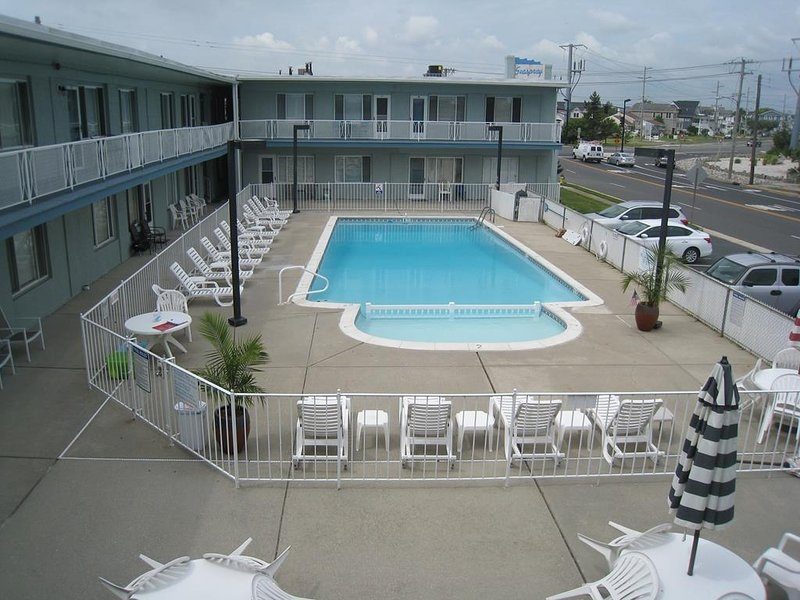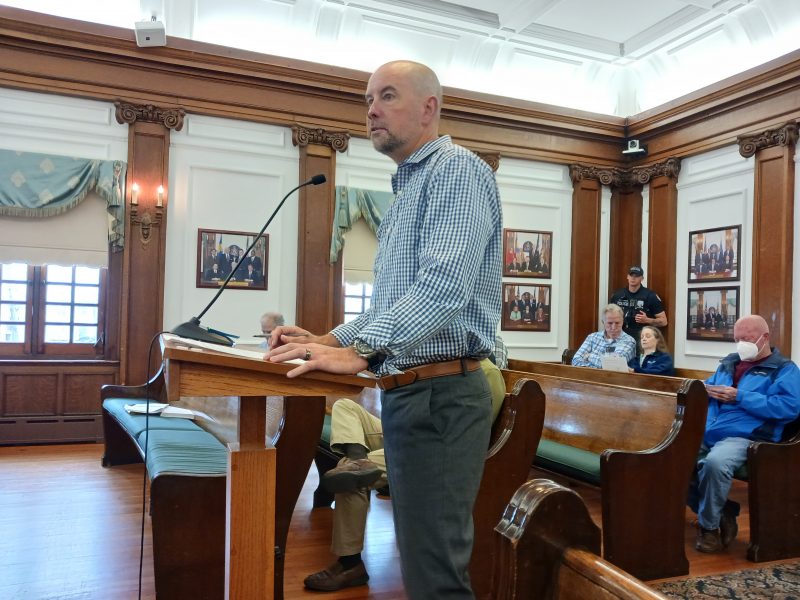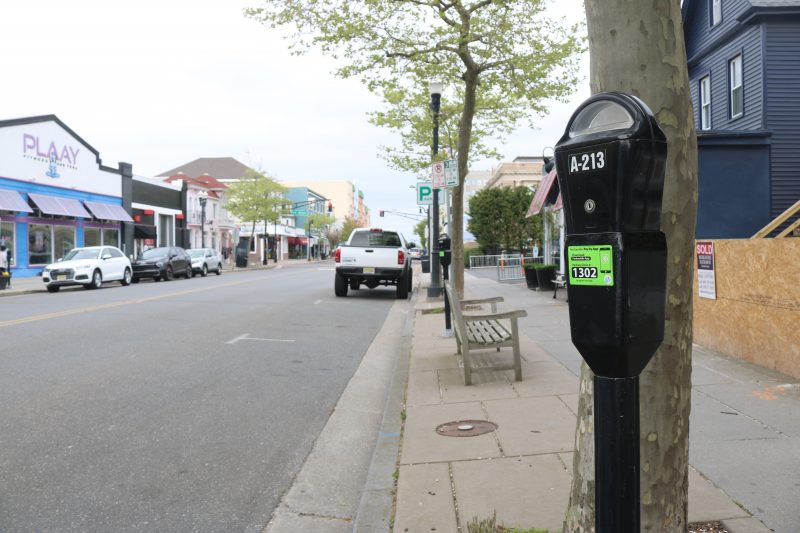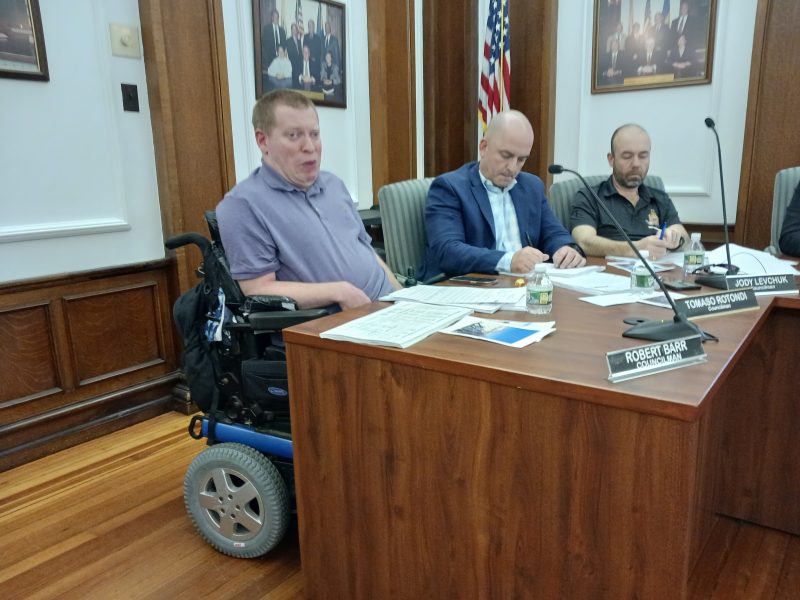Councilman Bob Barr, at left, wants the city to consider charging an occupancy tax on vacation rentals booked through the online services Airbnb and Vrbo.
 By DONALD WITTKOWSKI
An Ocean City condominium complex has been shut down after it was declared structurally unsafe by a state agency.
City Solicitor Dorothy McCrosson reported to City Council on Thursday night that the Seaspray condos at 34th Street and Bay Avenue have been “red-tagged” by order of the state Department of Community Affairs and remain closed.
McCrosson noted that the condo residents have been notified that assistance is available “though a couple of different avenues” to help them relocate while the building is shut down.
Standing by to provide assistance are the city’s Office of Emergency Management and OCNJ CARE, a nonprofit organization that provides help in the community, McCrosson said.
Councilman Bob Barr said he has received calls from some of the condo residents expressing their concerns.
“They don’t know what they’re going to do. They don’t have anywhere to go,” Barr said.
Mayor Jay Gillian explained that the state Department of Community Affairs is handling the shutdown and it is out of the city’s “realm.” However, he stressed that the city will try to help out the displaced condo residents.
“This is a DCA matter, this is a state of New Jersey matter, it’s the condo association. But with everything, we will do whatever we can to help them out,” Gillian said.
The condo complex is currently embroiled in litigation. McCrosson noted that the city is a defendant in the litigation, so she is restricted in what she can say while the lawsuit is pending in court.
In an interview after the Council meeting, McCrosson said that an engineering report concluded the condos are structurally unsafe. She didn’t immediately know who hired the engineer or exactly what type of unsafe condition was found.
By DONALD WITTKOWSKI
An Ocean City condominium complex has been shut down after it was declared structurally unsafe by a state agency.
City Solicitor Dorothy McCrosson reported to City Council on Thursday night that the Seaspray condos at 34th Street and Bay Avenue have been “red-tagged” by order of the state Department of Community Affairs and remain closed.
McCrosson noted that the condo residents have been notified that assistance is available “though a couple of different avenues” to help them relocate while the building is shut down.
Standing by to provide assistance are the city’s Office of Emergency Management and OCNJ CARE, a nonprofit organization that provides help in the community, McCrosson said.
Councilman Bob Barr said he has received calls from some of the condo residents expressing their concerns.
“They don’t know what they’re going to do. They don’t have anywhere to go,” Barr said.
Mayor Jay Gillian explained that the state Department of Community Affairs is handling the shutdown and it is out of the city’s “realm.” However, he stressed that the city will try to help out the displaced condo residents.
“This is a DCA matter, this is a state of New Jersey matter, it’s the condo association. But with everything, we will do whatever we can to help them out,” Gillian said.
The condo complex is currently embroiled in litigation. McCrosson noted that the city is a defendant in the litigation, so she is restricted in what she can say while the lawsuit is pending in court.
In an interview after the Council meeting, McCrosson said that an engineering report concluded the condos are structurally unsafe. She didn’t immediately know who hired the engineer or exactly what type of unsafe condition was found.
 City Solicitor Dorothy McCrosson, shown here during the April 13 Council meeting, said the Seaspray's condo association may pursue a number of options.
McCrosson told Council that the condominium’s association may possibly appeal the shutdown to the DCA or pursue other options.
“They have a 15-day right of appeal. The condominium association could decide to make repairs. They could challenge the decision of the DCA. They could decide as a group that they’re going to tear down the building. We don’t know what they’ll do, but they will act as an association,” she said.
Councilman Jody Levchuk expressed concern that the building could remain closed for an extended period of time.
“I don’t think anyone wants to see a red-tagged building anywhere in their neighborhood,” Levchuk said. “That’s why I’m asking, how long?”
Connor Brady, who owns a Seaspray condo, told Council that the association’s board of directors is considering its options, including repairing the building or possibly selling it to a developer.
In public remarks, Brady blamed the controversy on an unnamed “disgruntled” resident who is intent on “bullying everyone to get what he wants.” He did not elaborate.
Also at Thursday’s meeting, Council unanimously introduced the city’s proposed 2023 municipal budget.
The $98.9 million spending plan includes a 1.7-cent increase in the local tax rate, which would add an extra $88.50 on the annual tax bill for a homeowner who has a house assessed at $500,000.
The budget is scheduled for a public hearing and final vote at the May 25 Council meeting.
City Solicitor Dorothy McCrosson, shown here during the April 13 Council meeting, said the Seaspray's condo association may pursue a number of options.
McCrosson told Council that the condominium’s association may possibly appeal the shutdown to the DCA or pursue other options.
“They have a 15-day right of appeal. The condominium association could decide to make repairs. They could challenge the decision of the DCA. They could decide as a group that they’re going to tear down the building. We don’t know what they’ll do, but they will act as an association,” she said.
Councilman Jody Levchuk expressed concern that the building could remain closed for an extended period of time.
“I don’t think anyone wants to see a red-tagged building anywhere in their neighborhood,” Levchuk said. “That’s why I’m asking, how long?”
Connor Brady, who owns a Seaspray condo, told Council that the association’s board of directors is considering its options, including repairing the building or possibly selling it to a developer.
In public remarks, Brady blamed the controversy on an unnamed “disgruntled” resident who is intent on “bullying everyone to get what he wants.” He did not elaborate.
Also at Thursday’s meeting, Council unanimously introduced the city’s proposed 2023 municipal budget.
The $98.9 million spending plan includes a 1.7-cent increase in the local tax rate, which would add an extra $88.50 on the annual tax bill for a homeowner who has a house assessed at $500,000.
The budget is scheduled for a public hearing and final vote at the May 25 Council meeting.
 Chief Financial Officer Frank Donato briefs Council on the proposed 2023 municipal budget.
Frank Donato, the city’s chief financial officer, said higher healthcare costs, pensions, municipal salaries and inflation are largely to blame for rising expenses in this year’s budget.
But he also said the city has been able to limit the tax increase to a small amount by switching to a private healthcare fund and by increasing its revenues, such as parking and beach tag fees.
“We’re looking at different ways to balance this budget than just relying on taxation,” Donato said.
Beach tag fees are going up this summer. The cost of seasonal beach tags will rise from $25 to $35 if they are purchased June 1 or later. The city will continue to offer a preseason discount on seasonal tags bought through May 31. However, the discounted price will increase from $20 to $30.
Weekly beach tags will double from $10 to $20. Daily tags will also double, jumping from $5 to $10.
At the parking lots, the city will now have the ability to charge up to $25 per day during peak times in the summer tourism season. Last summer, the maximum daily parking fee was capped at $20 for the lots.
The city is also planning to raise the charge for parking meters in the Boardwalk and beach zones from $1.50 per hour to $2 per hour.
Parking meters in the downtown zone will go from 25 cents per hour to 50 cents per hour.
Chief Financial Officer Frank Donato briefs Council on the proposed 2023 municipal budget.
Frank Donato, the city’s chief financial officer, said higher healthcare costs, pensions, municipal salaries and inflation are largely to blame for rising expenses in this year’s budget.
But he also said the city has been able to limit the tax increase to a small amount by switching to a private healthcare fund and by increasing its revenues, such as parking and beach tag fees.
“We’re looking at different ways to balance this budget than just relying on taxation,” Donato said.
Beach tag fees are going up this summer. The cost of seasonal beach tags will rise from $25 to $35 if they are purchased June 1 or later. The city will continue to offer a preseason discount on seasonal tags bought through May 31. However, the discounted price will increase from $20 to $30.
Weekly beach tags will double from $10 to $20. Daily tags will also double, jumping from $5 to $10.
At the parking lots, the city will now have the ability to charge up to $25 per day during peak times in the summer tourism season. Last summer, the maximum daily parking fee was capped at $20 for the lots.
The city is also planning to raise the charge for parking meters in the Boardwalk and beach zones from $1.50 per hour to $2 per hour.
Parking meters in the downtown zone will go from 25 cents per hour to 50 cents per hour.
 Parking meters in the downtown zone will rise to 50 cents per hour as part of the price increase this summer.
In addition, there was a proposal originally backed by the Downtown Merchants Association to keep parking meters in operation year-round on the Asbury Avenue corridor between Sixth Street and 14th Street.
But now, the Downtown Merchants Association has reconsidered the proposal and will ask the city not to move forward with year-round parking on Asbury Avenue, Councilman Tom Rotondi said.
Originally, the merchants association thought that year-round meters would discourage non-shoppers from monopolizing the downtown parking spots. After giving the proposal further thought, the merchants now believe that year-round parking meters could discourage shoppers from visiting the downtown during the off-season.
As part of the budget discussion, Barr suggested that Ocean City should consider charging a 2 percent occupancy tax on vacation rental properties offered through the online booking services Airbnb and Vrbo. He noted that an occupancy tax would increase the city’s revenue.
Barr pointed out that more than 100 towns in New Jersey already charge an occupancy tax on vacation rentals.
He said towns that aren’t charging an occupancy tax are losing out on a key source of revenue and are “falling by the wayside.”
“It’s basically found money,” he said.
Gillian and Donato told Barr that the city is carefully looking into the possibility of charging an occupancy tax, but needs more time to study the issue. They noted that they will report back to Council at a later date with more details.
Council would have to approve an ordinance to impose an occupancy tax. If Ocean City decides to go that route, the occupancy tax would likely take effect next year for the 2024 municipal budget, city officials indicated.
Parking meters in the downtown zone will rise to 50 cents per hour as part of the price increase this summer.
In addition, there was a proposal originally backed by the Downtown Merchants Association to keep parking meters in operation year-round on the Asbury Avenue corridor between Sixth Street and 14th Street.
But now, the Downtown Merchants Association has reconsidered the proposal and will ask the city not to move forward with year-round parking on Asbury Avenue, Councilman Tom Rotondi said.
Originally, the merchants association thought that year-round meters would discourage non-shoppers from monopolizing the downtown parking spots. After giving the proposal further thought, the merchants now believe that year-round parking meters could discourage shoppers from visiting the downtown during the off-season.
As part of the budget discussion, Barr suggested that Ocean City should consider charging a 2 percent occupancy tax on vacation rental properties offered through the online booking services Airbnb and Vrbo. He noted that an occupancy tax would increase the city’s revenue.
Barr pointed out that more than 100 towns in New Jersey already charge an occupancy tax on vacation rentals.
He said towns that aren’t charging an occupancy tax are losing out on a key source of revenue and are “falling by the wayside.”
“It’s basically found money,” he said.
Gillian and Donato told Barr that the city is carefully looking into the possibility of charging an occupancy tax, but needs more time to study the issue. They noted that they will report back to Council at a later date with more details.
Council would have to approve an ordinance to impose an occupancy tax. If Ocean City decides to go that route, the occupancy tax would likely take effect next year for the 2024 municipal budget, city officials indicated.
 Councilman Bob Barr, at left, wants the city to consider charging an occupancy tax on vacation rentals booked through the online services Airbnb and Vrbo.
Councilman Bob Barr, at left, wants the city to consider charging an occupancy tax on vacation rentals booked through the online services Airbnb and Vrbo.